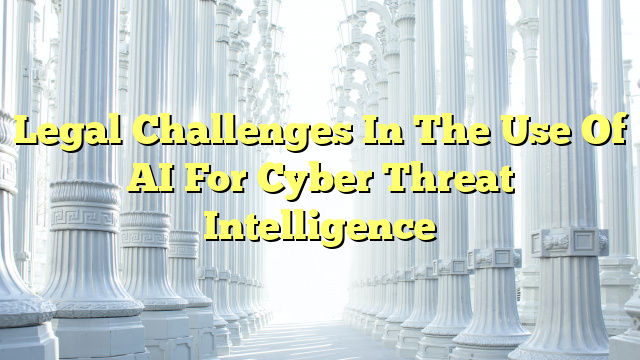Table of Contents
Legal Challenges Associated with Artificial Intelligence
Artificial Intelligence (AI) has revolutionized various industries, including cybersecurity. However, the use of AI in cyber threat intelligence also brings about several legal challenges that need to be addressed.
One of the main legal challenges is privacy and data protection. AI systems often require access to large amounts of data to train and improve their algorithms. This data can include personal information, which raises concerns about compliance with data protection laws. Organizations using AI for cyber threat intelligence must ensure that they have the necessary legal basis for processing personal data and that they implement appropriate security measures to protect the data.
Another legal challenge is liability. AI systems make decisions and take actions based on algorithms and data inputs. If these decisions or actions result in harm or damage, it can be challenging to determine who is liable. The responsibility may lie with the developers of the AI system, the organization using the system, or even the AI system itself. Clear guidelines and frameworks need to be established to determine liability in such cases.
Intellectual property rights are also a concern when it comes to AI. AI systems can generate new inventions, works of art, or other creative outputs. Determining the ownership and protection of these outputs can be complex, especially if multiple parties are involved in the development or use of the AI system. Legal frameworks need to be adapted to address the unique challenges posed by AI-generated intellectual property.
Lastly, there are ethical and moral considerations associated with AI in cyber threat intelligence. AI systems can be biased, discriminatory, or used for malicious purposes. Ensuring that AI systems are used ethically and in accordance with societal values is crucial. Legal frameworks should include guidelines and regulations to prevent the misuse of AI and to promote transparency and accountability.
Challenges of Artificial Intelligence in Cybersecurity
While AI offers significant advantages in cybersecurity, it also presents unique challenges.
One challenge is the potential for adversarial attacks. Adversarial attacks involve manipulating AI systems by inputting malicious data or exploiting vulnerabilities in the algorithms. This can lead to false positives or false negatives in threat detection, undermining the effectiveness of AI in cybersecurity. Developing robust defenses against adversarial attacks is crucial to maintain the integrity of AI systems.
Another challenge is the lack of interpretability and explainability in AI algorithms. AI systems often operate as black boxes, making it difficult to understand how they arrive at their decisions. This lack of transparency can hinder trust in AI systems, especially in highly regulated industries. Efforts are being made to develop explainable AI algorithms that provide insights into the decision-making process of AI systems.
Data quality and bias are also challenges in AI for cybersecurity. AI systems rely on large datasets to learn and make predictions. If the data used to train these systems is incomplete, biased, or of poor quality, it can lead to inaccurate or biased results. Ensuring the availability of high-quality, diverse datasets is essential to improve the accuracy and fairness of AI in cybersecurity.
Lastly, the rapid evolution of AI technology poses a challenge in terms of keeping up with legal and regulatory frameworks. AI advancements often outpace the development of laws and regulations, creating a gap in governance. It is crucial for policymakers and legal experts to stay informed about AI developments and adapt regulations accordingly to address emerging challenges.
Conclusion
The use of AI in cyber threat intelligence brings about legal challenges that need to be carefully addressed. Privacy, liability, intellectual property, and ethical considerations are among the key areas that require attention. Additionally, challenges such as adversarial attacks, interpretability, data quality, and evolving technology need to be tackled to ensure the effective and responsible use of AI in cybersecurity.

